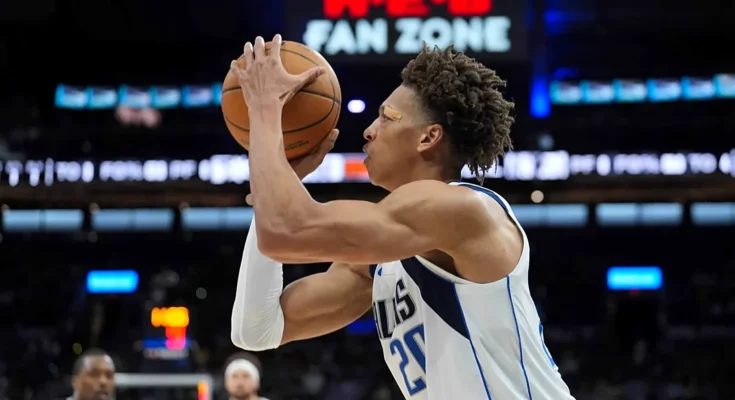Dallas Mavericks lose versatile and impactful two‑way forward Kessler Edwards to Denver in offseason move, further depleting their fragile frontcourt depth.
Kessler Edwards emerged as one of the most adaptable and essential spark‑plug players for the Dallas Mavericks during the 2024‑25 NBA season. When the team was beset by frontcourt injuries—Anthony Davis, Dereck Lively II, Daniel Gafford, P.J. Washington, and others sidelined—Edwards stepped into a crucial rotational role far beyond what anyone anticipated. Originally signed on a two‑way deal in August 2024, Edwards signed on around the same time—August 27, 2024—to bolster depth, splitting time between the Mavericks and their G League team, the Texas Legends. Despite being a developmental piece, he quickly became a stabilizing presence when health issues ravaged the Mavericks’ roster.
As the team’s most versatile option, Edwards made the most of every opportunity. Coach Jason Kidd even used him at center during one matchup in February, when both Davis and Lively were unavailable, and even P.J. Washington was sidelined. Edwards delivered a stat‑line of four points, six rebounds, six assists, and two steals in a narrow win versus Golden State—defensive versatility matched with hustle on both ends of the floor. Over the final stretch of the season—13 of his last 16 games—he averaged eye‑catching numbers: 12.8 points, 5.5 rebounds, and 1.2 blocks, shooting an efficient .558/.556/.900.
All told, Edwards appeared in 40 regular‑season games for Dallas, including 18 starts, logging around 15 minutes per night and producing averages of 4.2 points, 2.9 rebounds, and 1.1 assists, hitting a career‑high 40.7% from beyond the arc.
However, his availability was limited by the NBA’s two‑way contract rules: a player on that deal can be in the active lineup for only 50 regular‑season games. Edwards had reached that mark during a game against the New York Knicks on March 25, 2025—playing 19 minutes, posting four rebounds but no points—marking his 50th activation and rendering him ineligible for the rest of the season unless promoted to a standard contract. Because of salary cap constraints under the so‑called “first apron,” the Mavericks could not sign him to a full contract until April 10, since each minimum‑salary player would carry a nearly $12,000 daily cap hit, and the team had just about $51,000 in cap room.
The situation was indicative of broader roster‑management woes. In hindsight, Dallas could have rested him earlier in the season to preserve his eligibility during the final stretch, but they didn’t, and this misstep further strained an already crippled rotation. Fans were both appreciative and exasperated. One wrote, “Without superstars like Kessler Edward’s this team is sunk”. Another lamented the cascading injuries and rigid cap restrictions, noting that Dallas was dangerously close to playing with only six healthy players. One voice summarized the predicament bluntly: “Dallas is a case study in roster mismanagement”.
Nonetheless, Edwards made key contributions—one standout game coming on March 10 in a rare win over San Antonio, when he dropped a career‑high 22 points and grabbed 11 rebounds, plus four blocks in another outing. His toughness and versatility made him an unsung stalwart during one of Dallas’ most tumultuous seasons.
Ultimately, after the season ended, Edwards was not retained. He signed an Exhibit 10 (one‑year) deal with the Denver Nuggets—another Western Conference team—bringing his “three‑and‑D” skill set and positional flexibility to a deep, championship‑caliber roster. The Smoking Cuban noted that Dallas “quietly parted ways with another crucial piece of last year’s roster” and that Edwards—who the team never managed to promote to a full contract—was valued enough to garner interest and a spot in Denver.
Dallas’ loss is Denver’s gain: Edwards will now compete in training camp with a stacked roster lead by superstar Nikola Jokić, providing long‑term depth and versatility in their frontcourt.
For Mavericks fans, this departure stings—as one article put it, Edwards’ stint in Dallas may have come to an early end, and his role had been key precisely because the team’s rotation kept collapsing around its stars. His absence underscores the franchise’s ongoing struggles with constructing a resilient roster and managing cap space, especially in the wake of health‑related crises and roster moves like the controversial Luka Doncic trade.
Kessler Edwards’ season with Dallas was a lesson in making the most of opportunity. As a two‑way player originally expected to have a limited role, he met the moment whenever called upon—playing multiple positions, hitting threes when open, defending, rebounding, and protecting the rim. He was exactly the kind of high‑IQ role player that teams covet, especially amid injuries. Yet the rigid limitations of his contract and Dallas’ financial constraints meant that his availability ended prematurely—right when the team needed him most.



